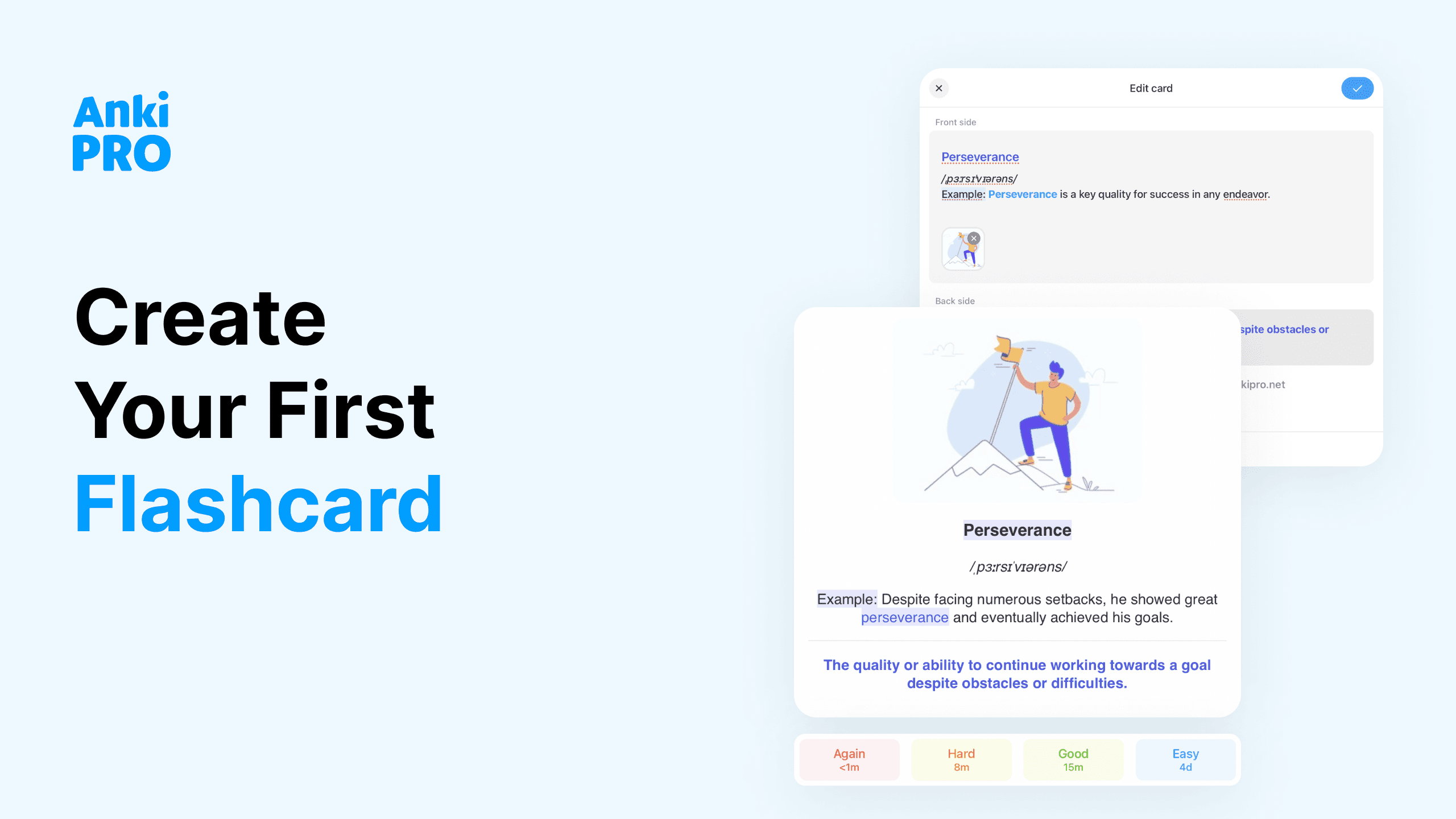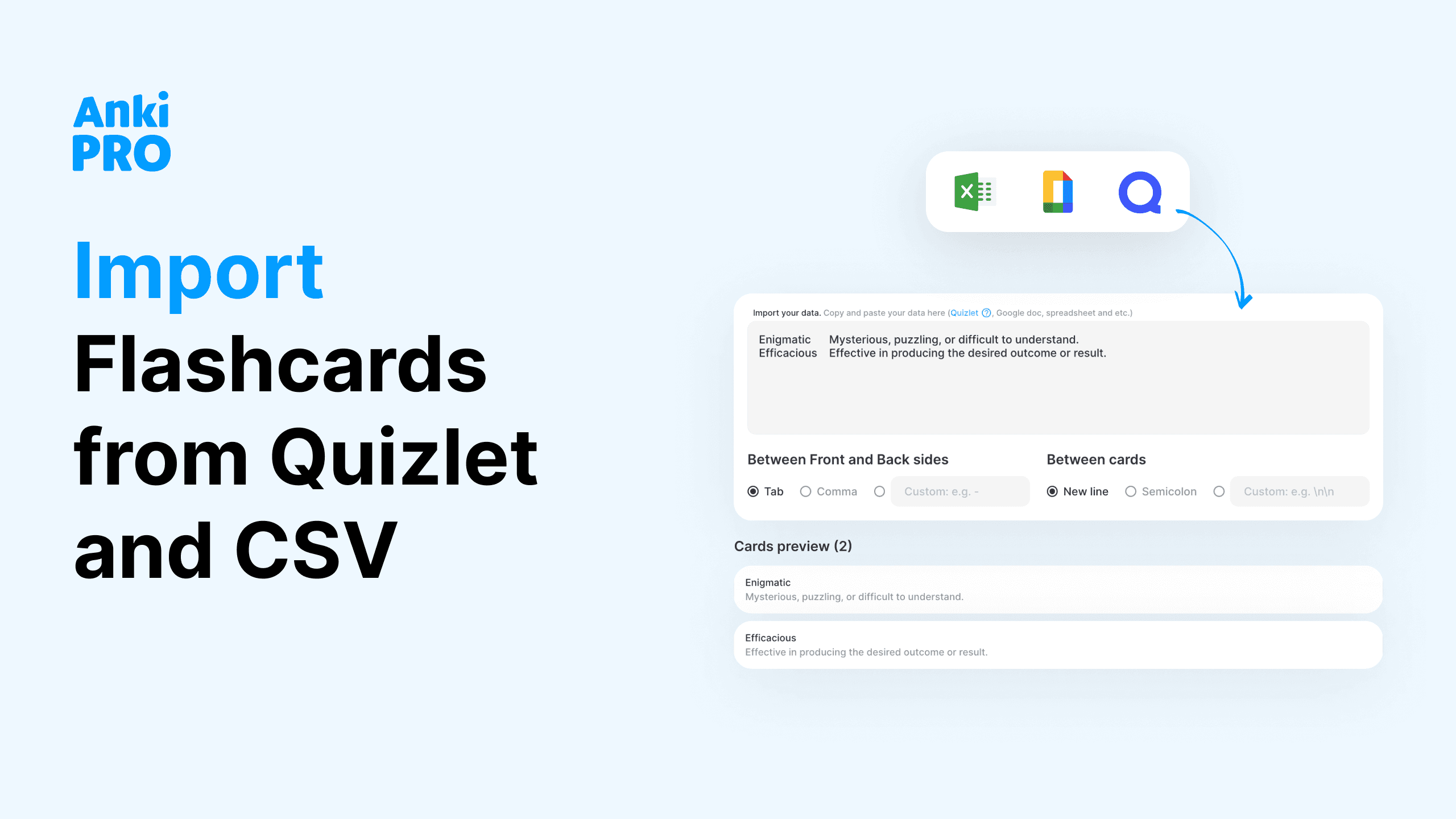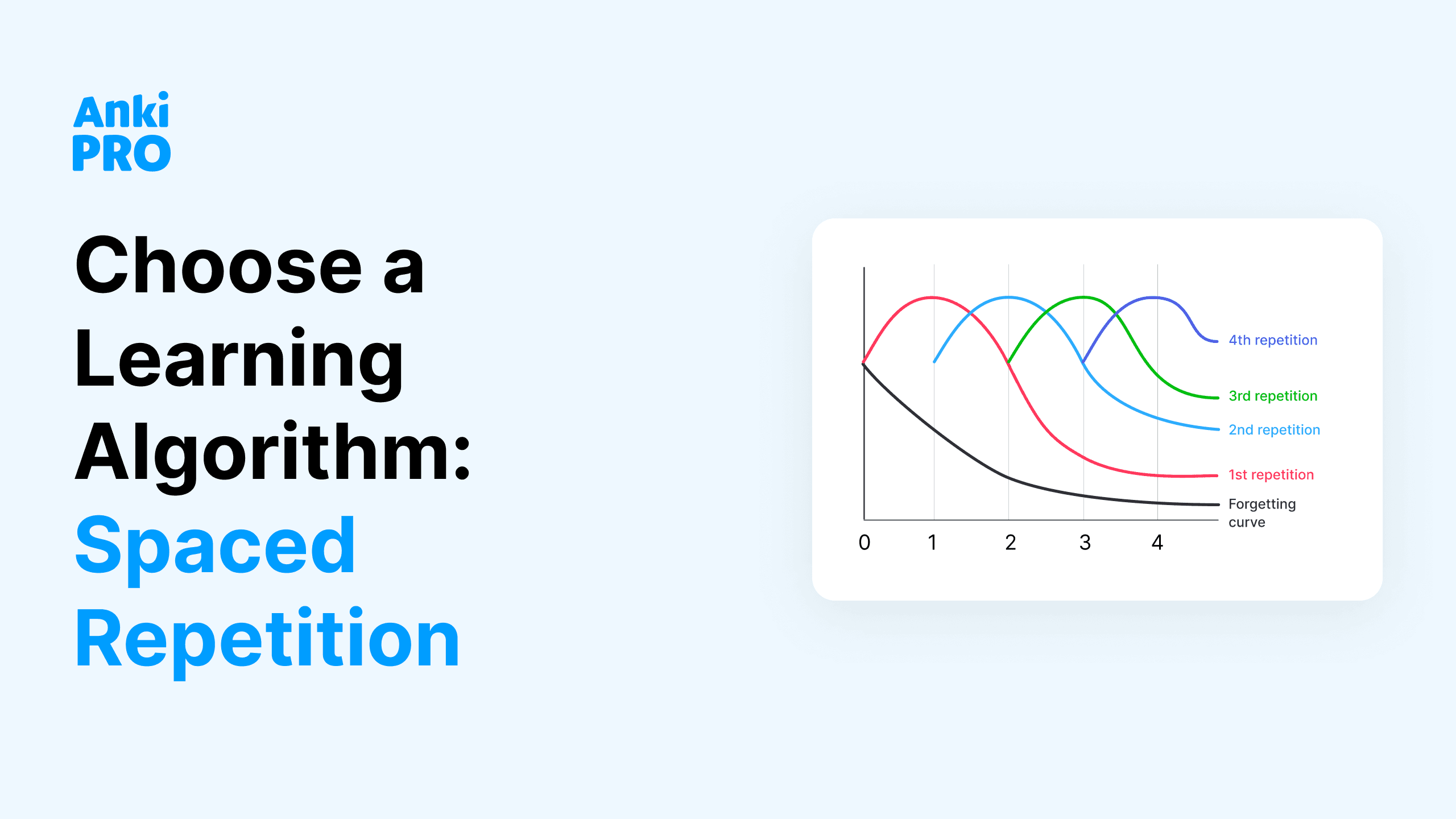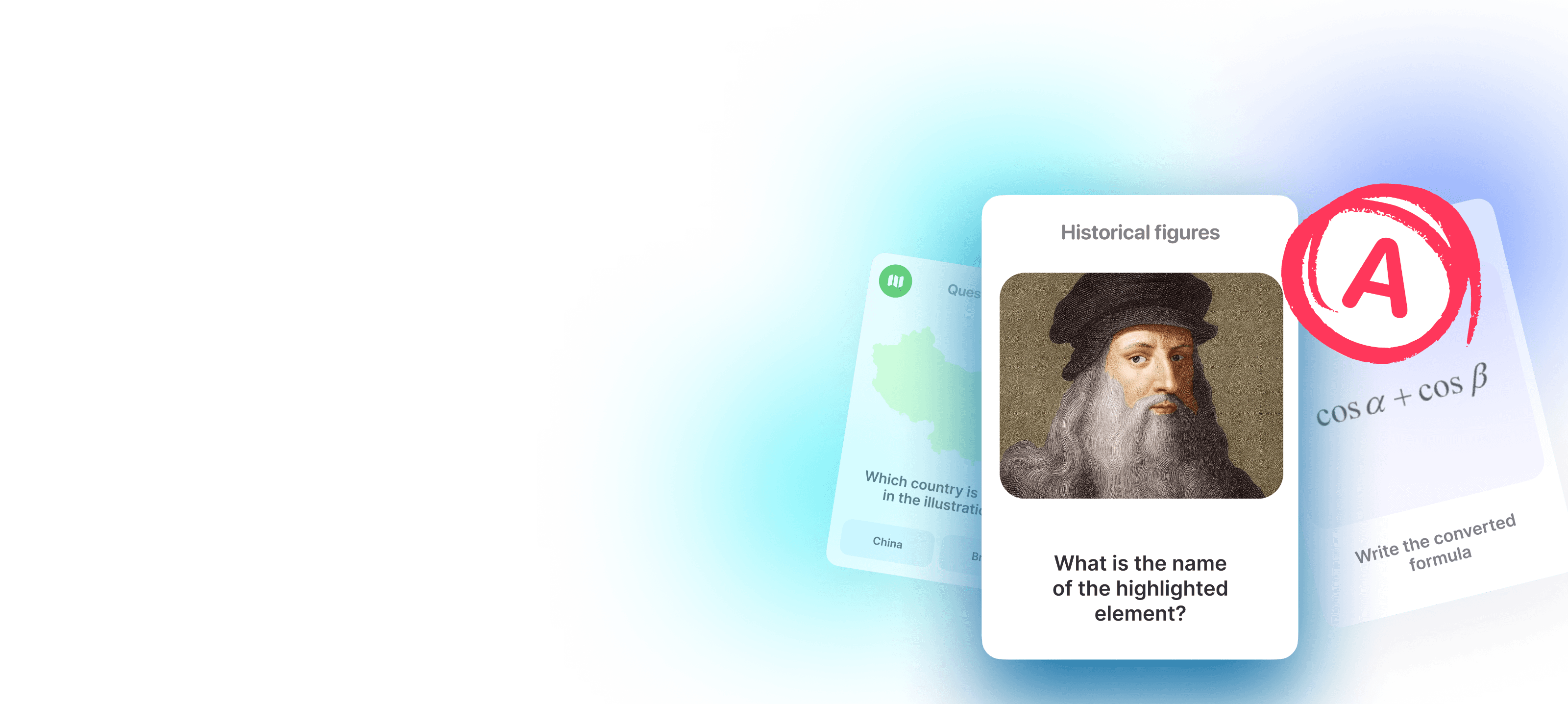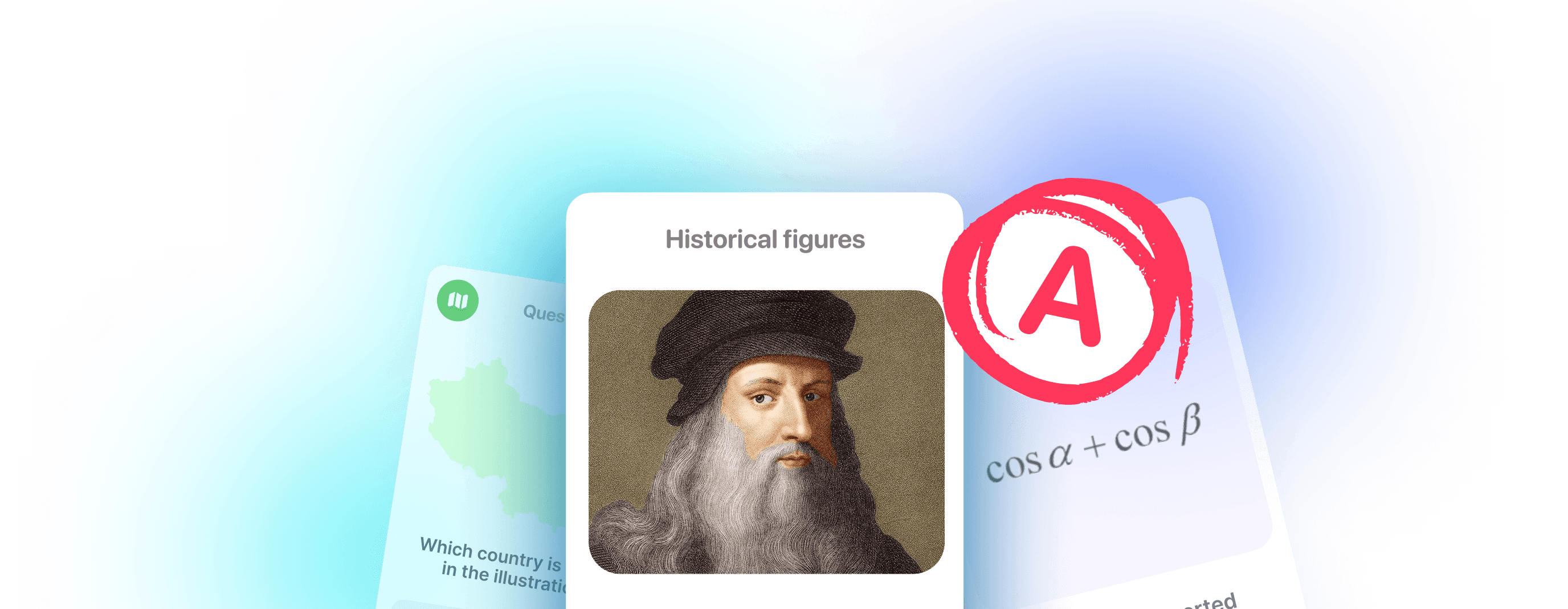Between going to class, hanging out with friends, extracurriculars, studying, and more — college students don’t have a lot of time on their hands. I get it: that time has to be well-managed and well-spent to make the most out of your days.
It seems like there’s an app for nearly everything these days, some purpose-built to support the college student lifestyle. I’ve compiled my favorite free apps to help students manage their busy schedules and do more with the limited time they have.
For Learning: AnkiPro

Research shows flashcards aid memory and retention through stimulated recall and spaced repetition.
To keep it simple: flashcards help you remember something rather than just recognize it, and the repetition of flashcards over a particular period is shown to turn newly learned concepts into memory way faster than simply reading over your notes!
Anki Pro study app uses a unique algorithm to show you flashcards in the right order to best support your studying goals. It lets you choose from over 50,000 pre-made decks or create flashcards from scratch — and it has the stats to back it up: 88% of those who used AnkiPro to study improved their grades.
Whatever your learning style, Anki Pro as a learning app has you covered. You can create flashcards with abilities to add photos, text, formulas, and more to develop interactive lessons on any type of material. It’s a perfect way to learn a foreign language or prepare for an exam!
Experts and educators worldwide agree that spaced repetition, the core idea behind Anki Pro’s algorithm, is the future of learning in the age of ADHD.
For Finances: Mint

You have to pay tuition, housing, school-related costs, meal plans, and more. The costs seem to be endless. On top of that, you may have to balance your budget with work-study or part-time jobs around campus.
Budget management can be as important as time management when getting by as a college student. This is where budgeting apps work as a secret weapon that helps to stay organized !
Mint is an excellent tool and budgeting app to help you stay on top of things. It integrates with your bank accounts and categorizes your spending so you can see where all of your money is coming from (and going). It’s time to know how much of your paycheck is going towards late-night pizza!
Mint helps you save money, set a budget, grow your savings, and understand your spending habits. You can set yourself a spending cap for college textbooks or meal expenses and get notifications to track how you’re progressing against your goals.
For Productivity: Forest

Can’t stop checking your phone during your study time? We get it, and so does Forest. This productivity app is all about helping you stay focused — by planting trees. Digital ones, yes, but also real ones.
Simply open the app, select a time duration, and plant your virtual tree. As long as you leave your app open and don’t switch to a different app while the timer is running, your tree will keep growing. But if you multitask, your tree will wither and die — and no one wants that to happen.
As you plant and grow trees, you earn coins. You can use these coins to buy different types of trees and plants. If you collect 2,500 coins, Forest will plant a tree for you in real life. So far, they’ve planted over 1.6 million trees out in the real world. That’s a pretty cool concept!
This app feels fashionable, minding the latest digital detox trend called „the dumb phone“, referring to a movement where Gen Zs are choosing to use basic, non-smartphones instead of advanced devices. This is driven by a desire to reduce distractions and promote a simpler, less technology-dependent lifestyle. But I recommend you start by downloading Forest or other apps that help to limit distractions!
For Inspiration: Are.na

Are.na is an online software for saving and organizing content. A selective Internet, if you will. The platform goes beyond simple bookmarking. It allows you to curate and organize multimedia content, from images to articles, creating visual collections that spark creativity.
Whether you’re brainstorming ideas, gathering references for projects, or collaborating with others, Are.na provides a collaborative and visually engaging space to fuel your creative process.
It’s not a direct study app but the platform allows students to mindfully connect to their subject area, browsing other users‘ collections of themed saved materials. The official description on the website says to think of Are.na as a garden of ideas, or Tumblr meets Wikipedia.
I recommend discovering inspirational tools, websites, and apps that add meaning and create a sense of intellectual progress. Respect your notes and study materials by organizing instant access to what’s important!
For Music: Spotify

This recommendation isn’t a surprise: Spotify is probably the most popular music streaming service out there, and that title is well-deserved. It’s a treasure trove of hits and brand new music, custom-built to accompany you through every mood and setting.
You may have already checked out their “Discover Weekly” and “Daily Mix” sets, but my favorite feature is the new AI DJ. It’s exactly what it sounds like: an AI-powered DJ that gets to know your music tastes and curates a soundtrack just for you, whenever you want.
A quick search for study music brings forward playlists like “Morning Study,” “Brain Food,” and more. Whether you prefer some lo-fi beats or classical music to accompany your study sessions, Spotify has you covered.
Background music is hard to underestimate, which makes Spotify an important study app.
A major bonus: Spotify has a majorly discounted membership for students.
For Mindmapping: Miro

Miro also has a hefty student discount worth checking out. This whiteboard app does more than just let you whiteboard. It’s a sandbox for your creativity, with every tool at your disposal to help you get your thoughts on the page.
Any type of multimedia can be added to your Miro board, from PDFs to emojis, videos to hand-drawn elements. You can add your own pictures to create mind maps for projects, visualize complex information, fill in to-do lists, do your homework, save journal articles, include handwritten notes, and so much more.
And if this open world is too much, it also has hundreds of pre-made templates you can take advantage of to help you mind-map, diagram your presentations, plan your homework schedule, research essay topics, and more.
For any group project or study session, you can easily invite your classmates to join you online and work together in a user-friendly environment.
My favorite thing about Miro is that its synchronous brainstorming format lets everyone contribute without having to raise their hand or speak over one another: you’re welcome, introverts.
For Reading: Libby

Calling all bookworms (or those who just want to save a few bucks): the Libby app is your new best friend. It’s definitely mine.
This app brings all your vast library, including ebooks and audiobooks, right to your smartphone. You can read books directly on your phone or send them to a Kindle or other device for easy access. It can become one of the most useful study apps if you use it for reading textbooks and study materials. From the Oxford Dictionary to the bestsellers of leading publishers, reading is your best friend on the way to understanding the world!
Libby can hold multiple library cards, so you can read books not just from your college’s collection but from your library back home if you’re feeling homesick.
The app provides you with free and easy access to all the books you need for your various classes. It can also support your personal happiness and entertainment — not all your reading has to be school-related, right?
For Writing: Grammarly

Between your notes, essays, homework, text messages, and emails — how many words are you writing in a single day? The number may be in the thousands.
Consider Grammarly your study buddy and personal editor. It’s one of the most useful study apps for college students since every subject implies writing papers or essays.
Despite what its name may suggest, it’s not just about grammar. It can help you brainstorm writing ideas, outline your writing, format your citations, and more. You can also access it across multiple devices, from your smartphone to your computer to your browser windows.
Grammarly can provide you with real-time feedback and suggestions to help bump you up a letter grade. It goes beyond proofreading to check your work for plagiarism, help you paraphrase complex ideas, and improve your grasp of grammar and writing with explanations around each suggestion.
The app works as a browser extension, too, so you can using while creating documents online via google drive to check if your text is grammatically and stylistically correct. And the most important features are free!
For Task Management: Todoist

Throw away your paper planner. Todoist helps you organize your school, life, and work all in one place. Its simple and minimalistic interface creates space for you to add and automatically prioritize everything that’s on your plate.
From study plans and class schedule to grocery lists, due dates, and extracurricular activities, Todoist is a solid productivity home base for your hectic student life.
I love this productivity app for many reasons, but primarily for its ease of use. You can create tasks using natural language (“remind me to call my mom tomorrow”) and Todoist will automatically assign a due date and other variables to the task. Integrations with your calendar and automatic reminders make sure nothing gets lost in the mix.
You can use Todoist to track not just school work and logistics but personal goals as well. Want to go to the gym three times a week? Want to call your parents every day? Let Todoist know and it’ll keep you accountable. Time management is finally getting realistic!
For Note Taking: Evernote

If your hand is cramping up from taking notes, go digital with Evernote, my note-taking study app of choice for busy college students. Evernote has been around since 2000, making it one of the most robust and long-lived tools out there, and for good reason.
With Evernote, you can organize lecture notes, pictures, handouts, and more in digital binders. You can even take a picture of your class whiteboards and digitize it, making it searchable and studyable.
Like most of the best study apps, Evernote note taking app combines different features in one app making it just pleasant to organize and go through your notes. Efficient learning requires some sense of joy as you complete tasks. Otherwise, what is it all for?
With proper permissions, you can use Evernote’s audio recording to record and annotate classes as a complement to your notes. Perhaps the best part is that Evernote is one of the many apps on this list that has a sizable student discount for students.
For Group Study Sessions: Zoom

Zoom became a loud name during the COVID-19 pandemic, serving as a virtual meeting space for work and socializing. Within our topic, Zoom serves as a study app, making it easy for students to connect with their study buddies, share study materials, and complete tasks together.
Joint learning is a fun activity, especially for someone with ADHD. It helps to stay committed due to the responsibility that it takes to show up.
Its versatility extends to group study sessions, allowing students to connect remotely for collaborative learning. With features like video conferencing, screen sharing, and breakout rooms, Zoom facilitates seamless interaction and teamwork, making it a popular choice for virtual group study sessions among students, making Zoom one of the most popular apps for college students.
For AI Assistance: GhatGPT

ChatGPT, powered by OpenAI, serves as a versatile AI assistant app that students can leverage for various academic tasks.
To maximize its benefits, students can utilize ChatGPT for brainstorming ideas, refining essay structures, and seeking clarification on complex concepts. When approaching ChatGPT, it’s helpful to provide clear and specific queries, breaking down questions into smaller parts for more focused responses.
Additionally, students can use ChatGPT as a tool for language practice, generating creative content, and even simulating conversations to enhance communication skills. By integrating AI into their learning routine, students can tap into a valuable resource for personalized assistance and support across a spectrum of subjects and challenges. It’s not THAT perfect to write meaningful essays for you, but you also don’t want to replace your intellectual revelations with machine
For Scanning Documents: Microsoft Office Lens

Microsoft Office Lens is a versatile scanning app that transforms your smartphone or tablet into a portable scanner. With its intelligent capture technology, the app allows you to digitize documents, receipts, whiteboards, and more with remarkable clarity.
Beyond mere scanning, the app offers features like automatic cropping and image enhancement, ensuring that your scanned materials appear sharp and professional. Seamlessly integrated with Microsoft Office applications such as Word and OneNote, this app streamlines the process of capturing and organizing essential documents for students and professionals alike.
There are lots of free apps for scanning, you’ve got the idea!
For Online Education: Khan Academy

This is a comprehensive online learning platform that provides a wide array of educational resources for students of all ages. Offering free, expert-led video lessons, practice exercises, and personalized learning dashboards, Khan Academy covers subjects ranging from mathematics and science to humanities and test preparation.
With a mission to provide a world-class education for anyone, anywhere, the platform empowers learners to progress at their own pace, reinforcing concepts through interactive exercises and quizzes.
The user-friendly interface and vast library of educational content make it a valuable tool for students seeking accessible and engaging online learning experiences. Sometimes it’s crucial to follow your passions seeking additional information. You can access the best apps for self-education for free, isn’t it amazing?
For Sleep: Sleep Cycle

Study apps are great but let’s end with the most important part of your day: night.
Jokes aside, sleep is crucial for college students. Lack of sleep negatively affects memory, mood, and focus, all of which contribute to academic success.
Sleep Cycle’s interface shows you analytics about your sleep quality so you can upgrade your day by improving your night. It wakes you up gently, gives you a menu of relaxing sleep sounds, and tailors your sleep program to suit your needs.
You can use the Sleep Cycle app across multiple devices, including your iPhone, Apple Watch, and iPad, so you can prioritize a good night’s sleep no matter where you are. Its smart reminders help to prioritize and track progress easily. Just try not to fall asleep at the library too often!
Stay Open to New Apps and Tools!
In conclusion, these 15 study apps offer a diverse range of tools and features to enhance the academic journey for students. From organizing study materials and creating interactive study sets to facilitating collaborative group sessions, these free apps cater to various learning styles and preferences.
Whether it’s streamlining the process of mind mapping, note-taking, browsing a vast library, learning with spaced repetition, or curating visual inspiration, each app contributes uniquely to the student experience. Apps for college students go beyond learning and managing tasks. It’s all about life-study balance
Embracing these digital tools can not only streamline studying but also foster a more efficient and collaborative approach to learning in today’s dynamic educational landscape.
Hopefully, your most used free apps are study apps!





